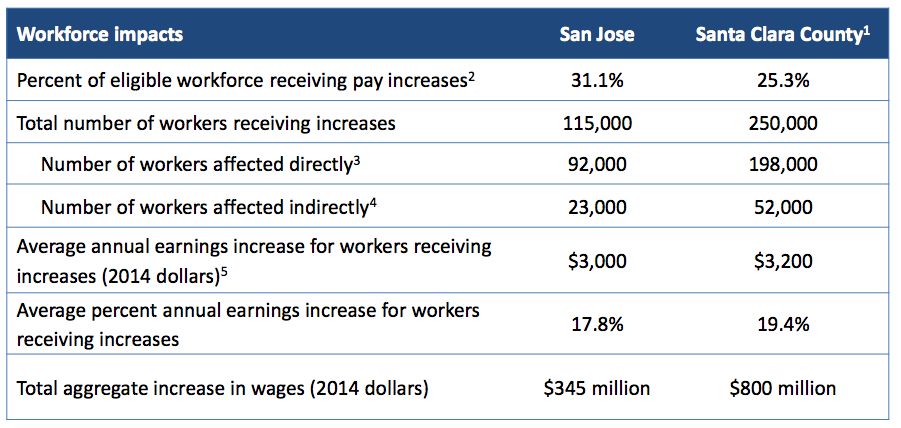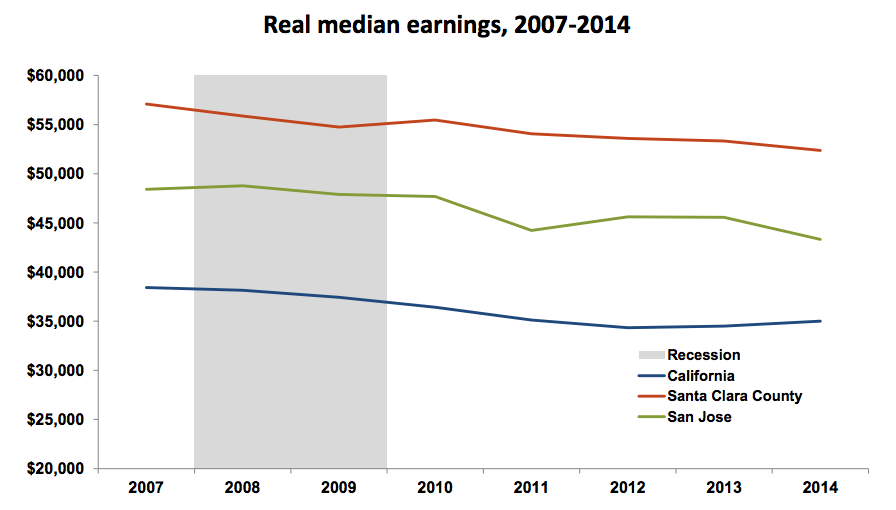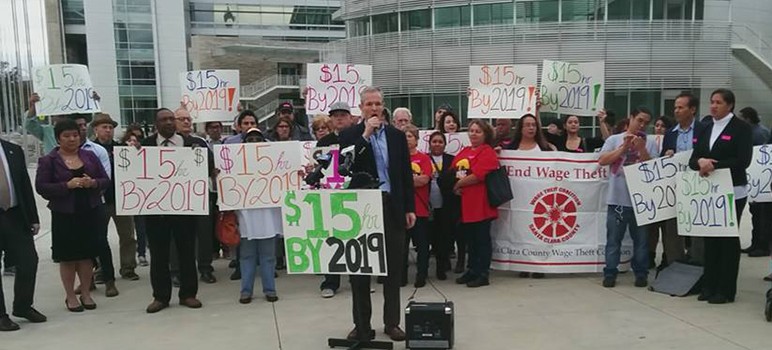San Jose will raise its minimum wage to $15 when the clock strikes 2019. The City Council’s unanimous vote Tuesday is part of a regional effort to up the hourly wage floor ahead of the statewide schedule to reach $15 by 2022.
Raising baseline to $15 will give 115,000 San Jose workers a collective $350 million-a-year pay bump, according to a report by the Institute for Research on Labor and Employment at the University of California, Berkeley. Doing so for all of Santa Clara County would give 250,000 workers a 20 percent raise amounting to a combined $800 million a year, per the report.

Source: UC Berkeley
The study found that there would be a net loss of 1,020 jobs if the city acts alone, but no loss at all if the entire nine-county Bay Area joins the “fight for $15.” There will also be a projected increase of 0.3 percent over a three-year period.
San Jose’s base pay increase will roll out in three phases, from $12 an hour in 2017 to $13.50 in 2018 and $15 by the start of 2019 with year cost-of-living adjustments. However, the council decided to exclude youth in work training programs.
San Jose’s vote this week brings it in line with several other cities in this county. Campbell, Milpitas, Santa Clara and Saratoga are expected to follow suit in the coming months. It also marks the nation’s first coordinated regional effort to raise the wage floor, according to Silicon Valley Rising, a coalition of labor unions and nonprofits.
We won, we won, we won! Victory for $15 in San Jose by Jan 1, 2019! #Sanjose pic.twitter.com/x77NPEuyla
— Scott Myers-Lipton (@smlipton) November 16, 2016
San Jose emerged as a leader in the movement in 2012 when voters passed a citizen initiative to raise the minimum wage to $10. The measure, which was drafted by a group of San Jose State students under guidance from sociology professor Scott Myers-Lipton, was followed by similar efforts in other cities.
Though Silicon Valley has seen considerable job growth since the Great Recession, median pay levels in the region have continued to fall.

Source: UC Berkeley
Local officials were split on how soon to phase in to $15 an hour. City staff as well as Mayor Sam Liccardo and his centrist council allies recommended waiting until the middle of 2019 and exempting parolees and foster youth in transitional work programs.
Council members Ash Kalra, Raul Peralez, Don Rocha and Magdalena Carrasco wanted to reach $15 along with other South Bay cities on Jan. 1, 2019—with no exemption.


Second Attempt, first was blocked by moderators.
“The thing that people miss when claiming that rising the minimum wage doesn’t result in job loss (and sometimes it doesn’t) is that the reports look at overall job numbers rather than the specific segment that is experiencing the wage increase. For instance, if another industry in the area grows, it masks the inescapable truth that jobs in the minimum wage sector will be lost, even if job increases elsewhere pick up the slack. Arguing for large increases in the least valuable segment of labor effectively puts out of work the people who can least afford it and who the increase was supposed to help in the first place.”
– Stolen quote from an article on DC Minimum Wage.
If you are a true progressive, fighting for the most oppressed and vulnerable and you support this effort, you may want to rethink that support. Many jobs in San Jose do not generate enough revenue to justify a $15 wage. Those jobs will be gone, perhaps replaced by better jobs that they lack the skills to compete for. Coupled with Measure E, which forces business owners to add hours to existing employees, many of these job losses may be permanent as they will have more barriers to acquire those skills. This criticism is not new, and the best answer I have seen is “those are crappy jobs, we don’t want them anyway”, completely hand waving away this unintended consequence.
If I learned one thing from the Rent Control hearings kabuki theater, the authors of these things tells the real story on the numbers and conclusions they come to regarding those numbers.
Michael Reich – While Wikipedia is a dubious source, it is the best source of info I can find on Mr. Reich. Some interesting tidbits gleaned from
https://en.wikipedia.org/wiki/Michael_Reich.
Mr. Reich cofounded the Union for Radical Economics, whose agenda was to “support an American version of socialism, with public ownership of production and a government-planned economy to meet social needs rather than the needs of private profit”. It seems that Mr. Reich plays a little fast and loose as well, see the times union article finding, “hundreds of pages of emails from Reich’s research team that showed a close collaboration between the research team and labor union groups that fund the movement to raise the minimum wage”
http://www.timesunion.com/tuplus-local/article/15-wage-research-fogs-issue-as-labor-business-7004332.php
Sarah Thomason – came to the Berkeley after a full time gig at NPA, National People’s Action, whose primary long term goal is the “Democratic Control of Capital”.
http://npa-us.org/files/long_term_agenda_0.pdf
Now that sounds good, except that the control of capital currently belongs to you and me, and I am not so sure giving that control to the government does not have the best track record over the past 100 years.
Annette Bernhardt – While doing some research into Ms. Bernhardt, I found a study, http://laborcenter.berkeley.edu/lowwageca/, which points out that there are 4.7M workers in CA that earn less than $13.63. Has it been considered what will happen to those that cannot compete for jobs that pay $15+ an hour when CA switches to $15/hour? How many of the poor will be cut off from the job market?
Claire Montialoux, Ken Jacobs, Sylvia Allegretto all have similar themes and solutions to the above three. I could not find one author who bought a dissenting viewpoint or solution. I will grant all involved believe strongly in the righteousness of their cause, as it seems Ms. Wadsworth does as well.
However, this type of endeavor has a high risk of group think and I think the press has not done their job in looking into the possible outcomes.
I got my first job at age 16 in a furniture manufacturing company. I made minimum wage, which then was $1.50/hour, $60/week gross, $48 take home. It was hard, dirty and dusty work. No OSHA back then. I knew I didn’t want to do that for the rest of my life, so I stayed in school, studied hard, went to and graduated from college, and had jobs while earning my degree. Some people just don’t have the drive to succeed, to better themselves. They are content to remain in their lower station, since a lot of rich white liberals will carry their water for them to get a higher wage even though they have done nothing more to earn a higher wage. Many of the poorly paid come here from other countries, yet don’t even have the initiative to learn the language of the country that has given them the opportunity to better themselves, which they lazily and disrespectfully refuse to take. Many, if not most, are apparently content to remain in their lowly jobs here, which is still much better than they had where they came from, but they will whine for more money in their own language. Personnel costs are the biggest percentage of the cost of most goods and services. Increased labor costs mean increased prices, an endless circle spiraling upward, the price of which we all pay every time we buy something.